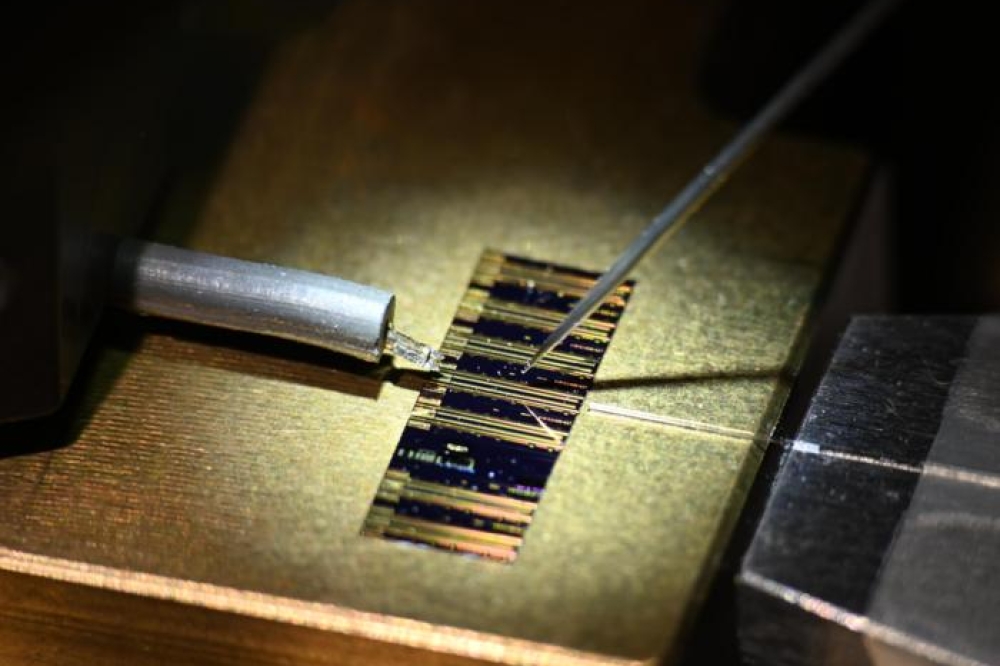News Article
Shedding new light on quantum physics for LEDs
Superconductivity and LED technology could provide a new approach to quantum devices
A team of University of Toronto physicists led by Alex Hayat has proposed a novel and efficient way to leverage the quantum physics phenomenon known as entanglement.
The approach would involve combining LEDs with a superconductor to generate entangled photons and could open up a rich spectrum of new physics as well as devices for quantum technologies. These could include quantum computers and quantum communication.
Entanglement occurs when particles become correlated in pairs to predictably interact with each other regardless of how far apart they are. Measure the properties of one member of the entangled pair and you instantly know the properties of the other. It is one of the most perplexing aspects of quantum mechanics, leading Einstein to call it “spooky action at a distance.”

Working with LEDs and superconductors to generate entangled photons (photo courtesy NSERC)
“A usual light source such as an LED emits photons randomly without any correlations,” explains Hayat, who is also a Global Scholar at the Canadian Institute for Advanced Research. “We’ve proved that generating entanglement between photons emitted from an LED can be achieved by adding another peculiar physical effect of superconductivity - a resistance-free electrical current in certain materials at low temperatures.”
This effect occurs when electrons are entangled in Cooper pairs-a phenomenon in which when one electron spins one way, the other will spin in the opposite direction.
When a layer of such superconducting material is placed in close contact with a semiconductor LED structure, Cooper pairs are injected into the LED, so that pairs of entangled electrons create entangled pairs of photons. The effect, however, turns out to work only in LEDs which use nanometre-thick active regions-quantum wells.
“Typically quantum properties show up on very small scales-an electron or an atom. Superconductivity allows quantum effects to show up on large scales-an electrical component or a whole circuit. This quantum behaviour can significantly enhance light emission in general, and entangled photon emission in particular,” Hayat says.
The research was published in Physical Review B on March 10th.
http://journals.aps.org/prb/pdf/10.1103/PhysRevB.89.094508
The approach would involve combining LEDs with a superconductor to generate entangled photons and could open up a rich spectrum of new physics as well as devices for quantum technologies. These could include quantum computers and quantum communication.
Entanglement occurs when particles become correlated in pairs to predictably interact with each other regardless of how far apart they are. Measure the properties of one member of the entangled pair and you instantly know the properties of the other. It is one of the most perplexing aspects of quantum mechanics, leading Einstein to call it “spooky action at a distance.”

Working with LEDs and superconductors to generate entangled photons (photo courtesy NSERC)
“A usual light source such as an LED emits photons randomly without any correlations,” explains Hayat, who is also a Global Scholar at the Canadian Institute for Advanced Research. “We’ve proved that generating entanglement between photons emitted from an LED can be achieved by adding another peculiar physical effect of superconductivity - a resistance-free electrical current in certain materials at low temperatures.”
This effect occurs when electrons are entangled in Cooper pairs-a phenomenon in which when one electron spins one way, the other will spin in the opposite direction.
When a layer of such superconducting material is placed in close contact with a semiconductor LED structure, Cooper pairs are injected into the LED, so that pairs of entangled electrons create entangled pairs of photons. The effect, however, turns out to work only in LEDs which use nanometre-thick active regions-quantum wells.
“Typically quantum properties show up on very small scales-an electron or an atom. Superconductivity allows quantum effects to show up on large scales-an electrical component or a whole circuit. This quantum behaviour can significantly enhance light emission in general, and entangled photon emission in particular,” Hayat says.
The research was published in Physical Review B on March 10th.
http://journals.aps.org/prb/pdf/10.1103/PhysRevB.89.094508































